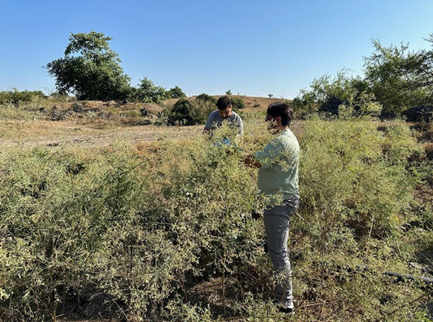

With the arrival of the Khareef season, the Governorates of Dhofar have been transformed into a verdant paradise, stretching from Mirbat and Salalah to Dhalkut and Rakhyut. This seasonal phenomenon, characterized by the greening of the landscape, has been a hallmark of the region for thousands of years. Native plants flourish, and trees become lush, spanning from plains to mountain tops and plateau areas. However, recent human interventions have begun to disrupt this delicate ecosystem.
One of the major threats to Dhofar's natural harmony is the introduction of invasive plant species. In 1998, a plant known as Parthenium was first spotted in the region. Within two decades, this invasive species started spreading across different areas of Dhofar, posing a significant threat to the local flora. The rapid proliferation of Parthenium has prompted a coordinated response from various authorities and institutions in Oman.
In 2021, the Environment Authority, Dhofar Municipality, and other institutions, including the Academy, collaborated to form a scientific team dedicated to managing the Parthenium invasion. This team, comprised of experts from the University of Nizwa's Natural and Medical Sciences Research Center, aims to control and manage the spread of Parthenium through a comprehensive study of its genetic, natural, and phytochemical characteristics.
The University of Nizwa's research team collected plant and seed samples from the Wilayats of Mirbat, Salalah, Rakhyut, and Dhalkoot during September and October 2023. They conducted a study on the germination physiology of 16 samples and prepared a preliminary report. The team extracted and isolated chemicals and growth-inhibiting compounds from Parthenium and began exploring local herbal extracts that may inhibit its growth.
The next phase of the study involves physical, biochemical, and molecular analyses of the plants. The researchers plan to conduct transcriptomic analysis of proteins, chemical characterization, modeling, and computational analysis. The culmination of this extensive research will be a final report and scientific publications, which will be presented to the scientific team and Dhofar Municipality, the primary funding organization for the study.
Dr. Ali Al Lawati, the Project Manager at the University of Nizwa, speaking about the project's significance, said, “These studies will enhance our understanding of the impact of this invasive species on the environment and biodiversity of the Governorate of Dhofar. In addition, it helps us develop sustainable management practices that assist the Municipality of Dhofar and the Environment Authority in controlling this invasive species. Management practices from these studies by the University of Nizwa are examples of utilizing and converting scientific outputs to outcomes that assist the environment and community.”
The ongoing efforts led by the University of Nizwa to combat the spread of Parthenium reflect a broader commitment to preserving Dhofar's unique ecosystem. By addressing the challenges posed by invasive species, the university aims to maintain the natural harmony that has defined the region for millennia.